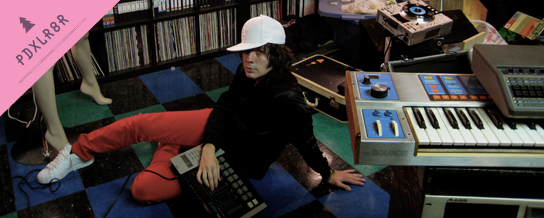In The Studio: Johnny Jewel
From his initial compositions as a noise producer to his post-glam work as half of […]

In The Studio: Johnny Jewel
From his initial compositions as a noise producer to his post-glam work as half of […]

From his initial compositions as a noise producer to his post-glam work as half of Glass Candy and the Shattered Theatre (Glass Candy’s earliest, semi-No Wave incarnation) to his newfound space-disco guru status (he’s one of the men behind the Italians Do It Better label), Portland veteran Johnny Jewel has put in work.
While journalists and bloggers often reduce Jewel’s semi-lo-fi productions to a form of retro Italo-disco worship, there’s a lot more to the experienced engineer’s sound palette than a few Giorgio Moroder tricks and and some trendy synths. Responsible for the post-goth vibes of Glass Candy, Farah, the recently disbanded and soon-to-be reformed Chromatics, and a bounty of other “top secret” projects set to emerge from the Italians label, Jewel has set the precedent for producers using their own favorite tools (either analog or digital) to create what sounds right to them. We called Jewel to talk moody melodies, MIDI, and what’s up with Portland pedal jockeys.
XLR8R: How did you first start producing?
Johnny Jewel: When I first started writing in high school, I was super into Sonic Youth and Velvet Underground. After I got a bit older, I got really, really into Karlheinz Stockhausen, Morton Feldman, and sound art. That’s how I first got drawn to synthesizers, through noise–or back then it was called “experimental music,” as there really wasn’t a noise movement yet. I never played in any bands before Glass Candy–I only produced noise records, like, along the lines of Forced Exposure, The Dead Sea, and that kind of scene. I feel like I’ve always been producing, even though I really didn’t know what it was called.
Are you involved with any of the new wave of Portland noise bands?
Portland’s small, so everyone knows each other, but I’m kind of an asshole on the subject because I’m not really a pedal freak. I’m much more into the John Cage approach–where you extract the sound through experimental application [and] it’s not just pedal loops and stuff like that. It’s cool, but I just like theme and composition with a little bit of improvisation. I like noise as an extension of music. I feel like noise was a necessary statement that needed to be made, but once it’s been made, it’s like, “Okay, let’s move on.” I don’t subscribe to any one genre and I feel like the noise scene, like hardcore in the ’90s, has become really dogmatic. I’m trying not to sound like a dick, but with a lot of noise stuff these days, there seems to be a superiority complex that exists. I was doing noise records in the mid-’90s that nobody knows about. It’s pretty funny to me, but music is music and I’m glad people are doing shit.
Is there any piece of gear that is essential to the Italians sound?
Everything that I’m drawn to is really moody and emotional. I’m going to naturally search out new projects and progress along those lines. Any instrument in the right hands can be really hot and any instrument can produce any moods. Most of the recordings that I produce involve a couple keyboards, from the ’70s. I’m really superstitious about them and I’ve had them since 1991–I’ve been doing this for a long time. I do not like preset sounds and I don’t have a drum kit that I use for every recording. I just have pads and old drum machines. Everything is played by hand, in real time–there’s no sound that’s identical in any particular song.
What are your thoughts on MIDI and digital recording techniques?
I don’t use MIDI–I don’t even know how to connect anything at all. I always listened to old records and most of the electronic stuff I liked was from the late ’70s and early ’80s, which was right on the threshold of MIDI really kicking in. The flow and the swagger of that era of electronic music is way looser and less uptight. I’m not hating on MIDI, I just come at production from a raw, live-musician angle and until I hit a wall doing what I do, I’m going to keep on doing that.
What sort of studio setting do you work in?
I have a studio in an old industrial building from the 1900s, located in a warehouse by the river. Apparently they used to make signs in it and now it’s converted into art spaces. I keep everything there and I don’t have any musical instruments at home. If I had a studio where I lived, I would never get anything done.
MP3: “Ssion (Glass Candy Remix)”
Feature: Glass Candy: After Dark
Favorite Portland artist:
There’s a lot of hot shit simmering in Portland, be it musicians, DJs, designers, or artists. The city is reaching a boiling point and it’s great to
be a part of it.

